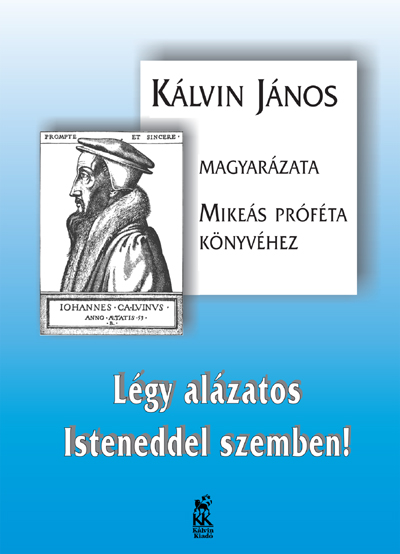Product Overview
Légy alázatos Isteneddel szemben! - Magyarázat Mikeás könyvéhez by John Calvin / Hungarian Translation of John Calvin's Commentaries On Jonah, Micah, Nahum / John Calvin's Explanation to the Book of Prophet Micah
PAPERBACK 2003
ISBN-10: 9633009545
ISBN: 9789633009543 / 978-9633009543
PAGES 230
PUBLISHER: KÁLVIN
About the Author:
John Calvin (/ˈkælvɪn/; French: Jean Calvin [ʒɑ̃ kalvɛ̃]; born Jehan Cauvin; 10 July 1509 – 27 May 1564) was a Frenchtheologian, pastor and reformer in Geneva during the Protestant Reformation. He was a principal figure in the development of the system of Christian theology later called Calvinism, aspects of which include the doctrines of predestination and of the absolute sovereignty of God in salvation of the human soul from death and eternal damnation, in which doctrines Calvin was influenced by and elaborated upon the Augustinian and other Christian traditions. Various Congregational, Reformed and Presbyterian churches, which look to Calvin as the chief expositor of their beliefs, have spread throughout the world.
Calvin was a tireless polemic and apologetic writer who generated much controversy. He also exchanged cordial and supportive letters with many reformers, including Philipp Melanchthon and Heinrich Bullinger. In addition to his seminal Institutes of the Christian Religion, Calvin wrote commentaries on most books of the Bible, confessional documents, and various other theological treatises.
Originally trained as a humanist lawyer, he broke from the Roman Catholic Church around 1530. After religious tensions erupted in widespread deadly violence against Protestant Christians in France, Calvin fled to Basel, Switzerland, where in 1536 he published the first edition of the Institutes. In that same year, Calvin was recruited by Frenchman William Farel to join the Reformation in Geneva, where he regularly preached sermons throughout the week; but the governing council of the city resisted the implementation of their ideas, and both men were expelled. At the invitation of Martin Bucer, Calvin proceeded to Strasbourg, where he became the minister of a church of French refugees. He continued to support the reform movement in Geneva, and in 1541 he was invited back to lead the church of the city.
Following his return, Calvin introduced new forms of church government and liturgy, despite opposition from several powerful families in the city who tried to curb his authority. During this period, Michael Servetus, a Spaniard regarded by both Roman Catholics and Protestants as having a heretical view of the Trinity, arrived in Geneva. He was denounced by Calvin and burned at the stake for heresy by the city council. Following an influx of supportive refugees and new elections to the city council, Calvin's opponents were forced out. Calvin spent his final years promoting the Reformation both in Geneva and throughout Europe.
Hungarian Summary:
Kálvin János magyarázata Mikeás próféta könyvéhez
Mikeás próféta Ézsaiásnak ifjabb kortársa volt. Prédikálása témáin, olykor még szóhasználatán is meglátszik a nagy prófétatárs hatása. Nagy különbséget jelent viszont az, hogy míg Ézsaiás a fővárosban, Jeruzsálemben élt, jól ismerte az ottani körülményeket, találkozott akár királyokkal is, addig Mikeás egy vidéki városkában hirdette az igét. Ámószhoz hasonló, egyszerű „paraszt-próféta” volt. Ézsaiás költőien szép stílusához képest, ő nyersebben fogalmazza meg haragos próféciáit. Megfordulhatott a fővárosban is, ott mondhatta egyik-másik jövendölését (pl. 3,9-12), javarészt azonban a vidéki lakosság fölött basáskodó, a gazdagodás érdekében törvénytelenségre is hajlandó „népnyúzó” (3,2) uraságokat ostorozza. Félelmes kép tárult fel előtte Istennek büntető ítéletéről, amelynek történeti közeledtét már jelezték az asszír hadjáratok. Ezt a lesújtó ítéletet hirdette népe előtt kemény hangú próféciáiban.
English Summary:
John Calvin's Explanation to the Book of Prophet Micah
The prophet Micah was Isaiah's younger contemporary. The influence of the great prophet, appear on the themes of his preaching, sometimes even in his words. However, there is a big difference: while Isaiah lived in the capital, Jerusalem, he was well aware of the conditions there, he met even kings, while Micah proclaimed the word in a rural town. He was a simple "peasant-prophet" like Amos. Compared to the beautiful style of Isaiah's poet, he expresses his anger prophecies more rawly. He was in the capital maybe, he could say one or another of his predictions (eg 3,9-12). In front of his eyes, appear a fearsome image about God's punishment, , whose historical approach has already been reported by the Assyrian campaigns. He proclaimed this devastating judgment to his people in his harsh prophecies.








